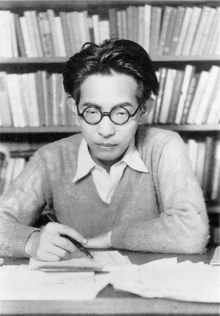Tatsuo Hori
Tatsuo Hori | |
|---|---|
 Tatsuo Hori in 1935 | |
| Born | 28 December 1904 Tokyo, Japan |
| Died | 28 May 1953 (aged 48) Oiwake, Karuizawa, Nagano, Japan |
| Occupation | Writer, translator |
| Alma mater | Tokyo Imperial University |
| Genre | Poetry, short stories, novels |
| Literary movement | Modernism, Proletarian Literature Movement |
Tatsuo Hori (堀辰雄, Hori Tatsuo, 28 December 1904 – 28 May 1953) was a Japanese translator and writer of poetry, short stories and novels.[1]
Early life[]

Born in Tokyo, Hori studied Japanese literature at Tokyo Imperial University under Saisei Murō and Ryūnosuke Akutagawa. In addition to Japanese writers of the time, he read the works of Ivan Turgenev, Gerhart Hauptmann and Arthur Schnitzler, the French symbolists, and the philosophical writings of Arthur Schopenhauer and Friedrich Nietzsche.[2][3]
While still a student, he contributed translations of modern French poets and also his own writings to the literary journal Roba,[1] published and edited by critic Tsurujirō Kubokawa.[4] He regarded himself as a disciple of Akutagawa, but also showed influences of Raymond Radiguet and Marcel Proust,[1] and the Proletarian Literature Movement.[5] His later works reflect a move towards modernism.[5]
Literary career[]
In 1930, Hori received recognition for his short story Sei kazoku (lit. "The Holy Family"), which was written under the impression of Akutagawa's death[1] and even paid reference to the dead mentor in the shape of the deceased character Kuki.[3]
Hori followed with a number of novelettes and poems, often characterized by the theme of death.[5] Ill with tuberculosis, he moved to a sanatorium in Nagano Prefecture,[1] which he used as the setting for his most famous novel, The Wind Has Risen.[5] Near the end of the Pacific War, he was evacuated to Oiwake, Karuizawa, Nagano, where he remained until his death in 1953.[1]
Hori is buried at Tama Reien cemetery in Tokyo.[1] In his honour, the Hori Tatsuo Memorial Museum of Literature was established in Karuizawa.[6]
Selected works[]
- 1930: Sei kazoku (聖家族)
- 1933–34: Utsukushii mura (Beautiful Village (美しい村))
- 1936–37: Kaze tachinu (The Wind Has Risen (風立ちぬ))
- 1937: Kagerou no nikki (かげろふの日記)
- 1941: Naoko (Naoko (菜穂子))
- 1941: Arano (曠野)
- 1942: Younen jidai (幼年時代)
Translations into English[]
- Hori, Tatsuo (1967). Selected Works of Tatsuo Hori: Beautiful Village, The Wind Awakes, Naoko. Tokyo: Sophia University.
- Hori, Tatsuo (1967). Kaze tachinu: A Japanese Novel. Translated by Kawamura, Mikio. Quebec: Westmount.
- Hori, Tatsuo (1985). "Les joues en feu". In Gessel, Van C.; Matsumoto, Tomone (eds.). The Shōwa Anthology: Modern Japanese Short Stories. Tokyo, New York: Kodansha International.
- Hori, Tatsuo (2005). "The Wind Has Risen". In Rimer, Thomas J.; Gessel, Van C. (eds.). The Columbia Anthology of Modern Japanese Literature: From Restoration to Occupation, 1868-1945. New York: Columbia University Press.
- Hori, Tatsuo (2013). "Aquarium (Suizokukan)". In Yiu, Angela (ed.). Three-dimensional Reading: Stories of Time and Space in Japanese Modernist Fiction, 1911-1932. Honolulu: University of Hawai'i Press.
References[]
- ^ Jump up to: a b c d e f g "堀辰雄 (Hori Tatsuo)". Kotobank (in Japanese). Retrieved 3 September 2021.
- ^ Hori, Tatsuo (2020). El viento se levanta (in Spanish). Translated by Starace, Irene. Editorial Verbum. ISBN 9788413371351.
- ^ Jump up to: a b Watanabe, Kakuji (1960). Japanische Meister der Erzählung (in German). Bremen: Walter Dorn Verlag.
- ^ "驢馬 (Roba)". Kotobank (in Japanese). Retrieved 3 September 2021.
- ^ Jump up to: a b c d Miller, J. Scott (2009). Historical Dictionary of Modern Japanese Literature and Theater. Lanham, MD: Scarecrow Press. ISBN 978-0-8108-6319-4.
- ^ "Hori Tatsuo Memorial Museum of Literature". Town of Kazuizawa (in Japanese). 19 February 2007. Archived from the original on 13 July 2010. Retrieved 4 September 2021.
External links[]
| Wikimedia Commons has media related to Tatsuo Hori. |
- Works by or about Tatsuo Hori at Internet Archive
- Works by Tatsuo Hori at LibriVox (public domain audiobooks)

- "E-texts of works by Tatsuo Hori". Aozora Bunko (in Japanese). Retrieved 4 September 2021.
- 1904 births
- 1953 deaths
- Japanese male poets
- Writers from Tokyo
- 20th-century deaths from tuberculosis
- University of Tokyo alumni
- Tuberculosis deaths in Japan
- 20th-century Japanese translators
- 20th-century Japanese poets
- 20th-century Japanese male writers
